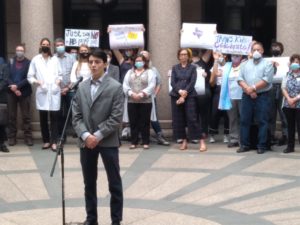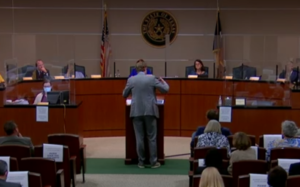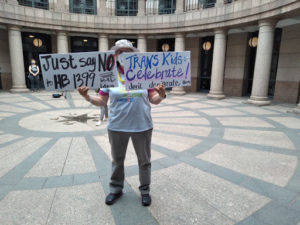Photo by Angelo Gaunichaux. In the underground rotunda of the Texas Capitol, an intersex activist expresses her opposition to the slate of anti-trans bills filed in the Legislature during a press conference.
Texas Legislature takes aim at parents and doctors of trans youth
Thursday, April 29, 2021 by
Angelo Gaunichaux Every once in a while, the monotonous, besuited cast of the Texas Capitol is overshadowed by the attention-grabbing hues of pride flags and the testimony of people showing up to ensure that their colors are seen and respected. And in mid-April, following the filing of House Bill 1399 and HB 68, Texas’ LGBTQIA+ community showed up in full force.
The two bills’ provisions criminalize the doctors and parents of trans youth who receive some forms of gender-affirming care. Despite hours of testimony from kids, parents, advocates, and medical professionals who could potentially be affected by the bill, HB 1399 passed out of committee on April 15.
“Taking away someone’s gender care is reprehensible and could really harm them psychologically,” Dr. Dan Nguyen, attending physician at the KIND Clinic, said. “And it could be financially devastating because they will likely have more hospital, emergency room and therapy visits which can be dangerous and more expensive for trans patients.”
Trans youth are increasingly worried that clinics like KIND, which provides accessible sexual health care, will have to start turning them away for fear of prosecution.
After waiting hours to testify on April 15, many left the Capitol disappointed when testimony was cut off at midnight, breaking with the previous tradition of keeping it going as long as necessary for all to be heard.

Landon Richie speaks out against anti-trans bills at a rally for trans youth in the underground rotunda of the Texas Capitol.
“Without the care I received, I would not have made it to 18,” trans activist Landon Richie told the Austin Monitor. “I was depressed before I came out and before I was able to go on hormones. Medically transitioning improved my mental health, my performance in school, my relationships with my friends, and the way I navigated the world.”
For trans kids, Landon explained, the timing of medical transition is crucial since some treatments are dependent on whether the child is pubescent. The use of puberty blockers can actually protect a trans person from having to do even more intensive treatments later in life. Not having them would force trans children to endure a male or female puberty that changes their bodies in permanent ways even after receiving gender-affirming medical care.
“I cannot imagine having to wait until 18 to be able to medically transition because I came out so early,” Richie said. “If I had been able to start hormone blockers there may have been a chance for less intense procedures, but my female puberty already started so I simply needed top surgery. People don’t understand what it is like to feel like you’re in the wrong body; appearing as something you’re not creates a lot of anguish and discomfort.”
Both HB 1399 and HB 68 reiterate the unlawfulness of already unlawful forms of sexual abuse and child neglect while defining gender-affirming care as abuse along with procedures like mastectomies and vasectomies. Both bills also make it criminal to provide puberty blockers to minors.
These bills have the intersex community on edge as well. One bill requires genetic testing be done on a child born intersex to determine the infant’s chromosomal makeup in order to establish their sex. Then the gender assignment surgery that the state of Texas thinks is appropriate for infants – male reassignment surgery for those with XY chromosomes and female reassignment surgery for those with XX chromosomes – would be permitted, against the advocacy of intersex organizations like InterACT.
Groups like the consortium Promise to America’s Children, or PAC, advocate for the model legislation of the Texas bills – S.778, the Protecting Children from Experimentation Act of 2021. The group, which claims it’s composed mainly of concerned parents and policymakers, has hosted virtual events on the topic and promotes its message in part through PAC member the Heritage Foundation.
Calling gender-affirming care a consequence of the government seeking to “sexualize children for the sake of a political agenda,” PAC teaches parents that being transgender is a trend and frames the wave of anti-trans bills across the country as protecting children from subversive messaging about sex, gender and left-leaning politics.

Rep. Matt Krause addresses the Texas Public Health Committee regarding HB 1399.
“There are people who didn’t get to testify who regret going on puberty blockers,” HB 1399 co-author Rep. Matt Krause (R-Fort Worth) said at the April 15 hearing. “The top scientists in the UK, in the last few years, have made a radical shift on the long-term effect of puberty-blockers – there are people who didn’t get to testify who wish they hadn’t gone through this at such a young age … so as policymakers, we just want to make sure we are making the right policy decision that doesn’t do harm.”
The Amsterdam Cohort of Gender Dysphoria Study (1972-2015), the largest study of its kind, found only 0.6 percent of trans women and 0.3 percent of trans men regretted undergoing their sex change. The American Academy of Pediatrics contends that hormone blockers reduce the risk of suicidal ideation in trans teenagers with little known long-term negative effects, and the American Medical Association Journal of Ethics agrees.
“If we’ve got a chance for people to get to 18 and make those decisions afterwards, that’s their decision,” Krause said. “We make policy after policy stopping those under 18 from making certain decisions so I can’t see why we wouldn’t do that on something as momentous as gender.”

Retired teacher Irene Andrews shows off her homemade protest signs before the trans youth rally at the Capitol.
While many business leaders in Texas have expressed opposition to the slew of anti-trans bills, there is still a grim outlook for opponents of the bills. Advocates are encouraging others to support trans children and adults in ways that go beyond calling representatives, sending emails or giving in-person testimony at the Capitol.
“It takes so much more than telling trans kids that they are loved and are seen,” Richie said. “Stand up for us when we are not in the room and let people know the impact of what they are saying in order to try your best to educate them on what it means to be transgender.”
HB 1399 is currently awaiting a vote from the House of Representatives, while HB 68 has yet to be passed out of House Committee. Track HB 1399 and HB 68.
LGBTQIA+ mental health support is available around-the-clock at the Trevor Project’s support line at 866-488-7386 or text 678-678.
This story was written by a journalism student at the University of Texas at Austin. The Austin Monitor is working in partnership with the UT School of Journalism to teach and publish stories produced by students in the City and County Government Reporting course.
The Austin Monitor’s work is made possible by donations from the community. Though our reporting covers donors from time to time, we are careful to keep business and editorial efforts separate while maintaining transparency. A complete list of donors is available here, and our code of ethics is explained here.
You're a community leader
And we’re honored you look to us for serious, in-depth news. You know a strong community needs local and dedicated watchdog reporting. We’re here for you and that won’t change. Now will you take the powerful next step and support our nonprofit news organization?













